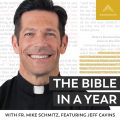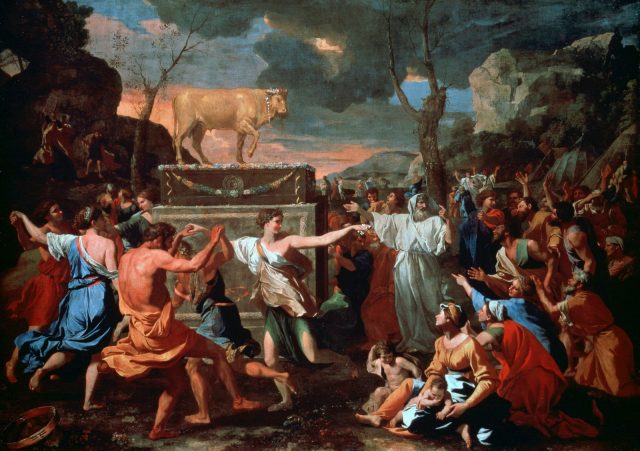
Today, Fr. Mike went through Exodus 32 and Leviticus 23. The passage in Exodus deals with the golden calf that the Israelites started worshiping. Fr. Mike also pointed out that this is where the Levitical priesthood is born, in verses 25-29:
And when Moses saw that the people had broken loose (for Aaron had let them break loose, to their shame among their enemies), then Moses stood in the gate of the camp, and said, “Who is on the Lord’s side? Come to me.” And all the sons of Levi gathered themselves together to him. And he said to them, “Thus says the Lord God of Israel, ‘Put every man his sword on his side, and go to and fro from gate to gate throughout the camp, and slay every man his brother, and every man his companion, and every man his neighbor.’” And the sons of Levi did according to the word of Moses; and there fell of the people that day about three thousand men. And Moses said, “Today you have ordained yourselves[a] for the service of the Lord, each one at the cost of his son and of his brother, that he may bestow a blessing upon you this day.”

So what made the tribe of Levi so special that priests could come only from them? They slaughtered a bunch of me who were stupid enough to worship a damn cow that they themselves had made. I mean, it’s no secret where the cow came from. The chapter begins with a command from the people: “When the people saw that Moses delayed to come down from the mountain, the people gathered themselves together to Aaron, and said to him, ‘Up, make us gods, who shall go before us; as for this Moses, the man who brought us up out of the land of Egypt, we do not know what has become of him.'” These idiots see the idol being made and then turn right around and credit it with their deliverance from Egypt. They’re simple people at best. They’ll literally worship just about anything. God should have had pity on their stupidity, but instead, he had Moses kill a bunch of them.
At first, God wants to kill them all, but Moses talks him down from that ledge:
But Moses besought the Lord his God, and said, “O Lord, why does thy wrath burn hot against thy people, whom thou hast brought forth out of the land of Egypt with great power and with a mighty hand? Why should the Egyptians say, ‘With evil intent did he bring them forth, to slay them in the mountains, and to consume them from the face of the earth’? Turn from thy fierce wrath, and repent of this evil against thy people. Remember Abraham, Isaac, and Israel, thy servants, to whom thou didst swear by thine own self, and didst say to them, ‘I will multiply your descendants as the stars of heaven, and all this land that I have promised I will give to your descendants, and they shall inherit it for ever.’” And the Lord repented of the evil which he thought to do to his people.
It’s amusing that the way Moses talks God out of killing them is by appealing to God’s pride. “I mean, look — you’re going to seem foolish if you deliver all these people from Egypt and then just kill them.” Strangely enough, though God never changes according to the Bible and never does evil (also according to the Bible), he “repented of the evil which he thought to do to his people.”
Now how does Fr. Mike deal with these difficulties? Simple — he doesn’t. He talks about how we like to make God into an idol that we can control. We put him in our pocket and then take him out when times are tough. That’s a fair enough assessment, I think, but it doesn’t really deal with the weirdness of the passages he read for us today.
The other passage today was Leviticus 23, which deals with the feast days God wants people to celebrate. “These are the appointed festivals of the Lord, the holy convocations, which you shall celebrate at the time appointed for them” (verse 4). Obviously, Christmas and Easter aren’t in there, but a whole bunch of feasts that I grew up celebrating are, and I grew up celebrating them for a very simple reason: the Bible says to do so, and nowhere in the New Testament does it say to stop celebrating them.
Indeed, the passages requiring them are quite specific that these are ordained for all time:
- Verse 14 is about the offering of First Fruits: “You shall eat no bread or parched grain or fresh ears until that very day, until you have brought the offering of your God: it is a statute forever throughout your generations in all your settlements.”
- Verse 21 is about the Feast of Weeks (Pentecost): “This is a statute forever in all your settlements throughout your generations.”
- Verse 31 is about Atonement: “You shall do no work: it is a statute forever throughout your generations in all your settlements.”
- Verse 41 is about the Feast of Tabernacles (Booths): “You shall keep it as a festival to the Lord seven days in the year; you shall keep it in the seventh month as a statute forever throughout your generations.”
Recall Zachariah 14:16 from a few days ago: “Then every one that survives of all the nations that have come against Jerusalem shall go up year after year to worship the King, the Lord of hosts, and to keep the feast of booths.” It seems pretty clear that God is ordaining these celebrations for all times and all people. Why don’t most Christians celebrate them anymore?
Fr. Mike, of course, did not deal with that. And I can’t really blame him: this is “The Bible in a Year” podcast, not “The Bible in a Year for Skeptics” podcast. But it does illustrate one tendency I’ve noticed about believers. Those tricky parts, those troubling parts — they don’t see them. Even when they’re there in front of them, they don’t see them.
“God is mysterious,” and it’s all taken care of.